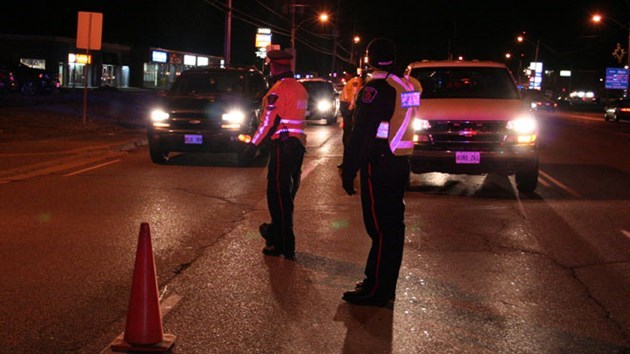Greater Sudbury Police have charged, on average, one person a day with impaired driving this year.
As of Nov. 17, the local police service had issued 299 charges for impaired driving. Broken down, 145 of the charges were for alcohol, while 143 were for drugs.
In comparison, GSPS issued a total of 203 impaired driving charges in 2020, 137 for alcohol and another 66 for drugs.
“There's been a real uptake in drug occurrences,” said Sgt. Blair Ramsay, with GSPS’ traffic management unit.
Earlier this year, police officers were seeing many more impaired-by-drug charges, but now that pandemic restrictions have eased considerably, and bars are now open, alcohol-related impaired charges have caught up, Ramsay said.
And it’s not like there is a lack of information on the dangers of it or lack of education on why impaired driving is deadly, he said. Everywhere you go, there is some form of educational piece about the dangers and consequences of impaired driving, and there’s an emphasis on getting the message across to high school students.
“That (education) is really paying dividends in the calls for service we are getting,” said Ramsay. “The community is a big reason why we are seeing a high number of impaired drivers. We're getting a lot of phone calls, and we're able to get to them and get them off the roads and make their lives a little bit safer.”
While disappointed with the high number of impaired charges this year, Ramsay said the silver lining is the fact people in the community are taking it upon themselves to report suspected impaired drivers and leaving it to police to apprehend them.
“It's kind of twofold,” Ramsay said. “The increase in community calls, we want to keep that coming. We want that high volume of calls from the public, because they’re our eyes and ears out there. We can't be everywhere.”
Even if you are not sure a driver is impaired, Ramsay said call police anyway, and let officers determine whether or not a suspected impaired driver is, indeed, impaired.
“Keeping the road safe is everyone’s responsibility,” he said.
With the holidays fast approaching, police anticipate the potential for more people drinking and driving
“We’re hoping it at least stays stable or goes down, but I’m expecting an increase,” he said.
The fact valuable services like Safe Ride Home Sudbury have had to suspend their services again this year due to the pandemic will likely result in people choosing to drive while impaired.
“It's unfortunate, because it has taken away an option for people to not drink and drive,” he said. “There are lots of other options out there. Plan ahead, plan ahead, plan ahead, and look at alternatives. There's always an alternative to drinking and driving.”
Greater Sudbury Police is now preparing for the launch of the Festive RIDE program on Nov. 26, held in conjunction with the Ontario Provincial Police and community partners like Safe Ride Home Sudbury, Action Sudbury, Tim Hortons and MADD Canada, among others.
During last year’s Festive RIDE campaign, GSPS charged 58 drivers with impaired between Nov. 27 to Dec. 31 (41 for alcohol, up from 38 in 2019; 17 for drugs, up from four in 2019).
MADD Canada released a report in August 2021 that revealed an average of 10 impaired driving charges and short-term provincial licence suspensions were laid every hour in Canada in 2019.
The report showed 86,964 total charges and short-term suspensions were laid, or 232 charges for every 100,000 Canadians.
Ontarians accounted for 15,336 of those charges (13,039 for alcohol, 2,297 for drugs)
MADD Canada Chief Executive Officer Andrew Murie said a key finding in the report was the increase in the rate of alcohol-related charges and short-term suspensions, which had been on the decline for several years.
That rate actually increased from 75,393 in 2018 to 77,645 in 2019. It marked the first increase in alcohol-related charges and short-term suspensions since 2011, he said.
However, Murie said in the report that the increase must be viewed within the context of the new mandatory alcohol-screening law that went into effect in late 2018, giving police the authority to demand a roadside breath test from every driver lawfully stopped.
“An increased rate of charges or suspensions does not directly translate to an increased number of impaired drivers, particularly when you factor in new laws. MADD Canada strongly believes the increase in charges in 2019 is likely largely due to the introduction of mandatory alcohol screening,” Murie said in the release. “This measure is something that MADD Canada had been calling on lawmakers to introduce for nearly a decade, and we are pleased to see it in place and working so effectively.”
